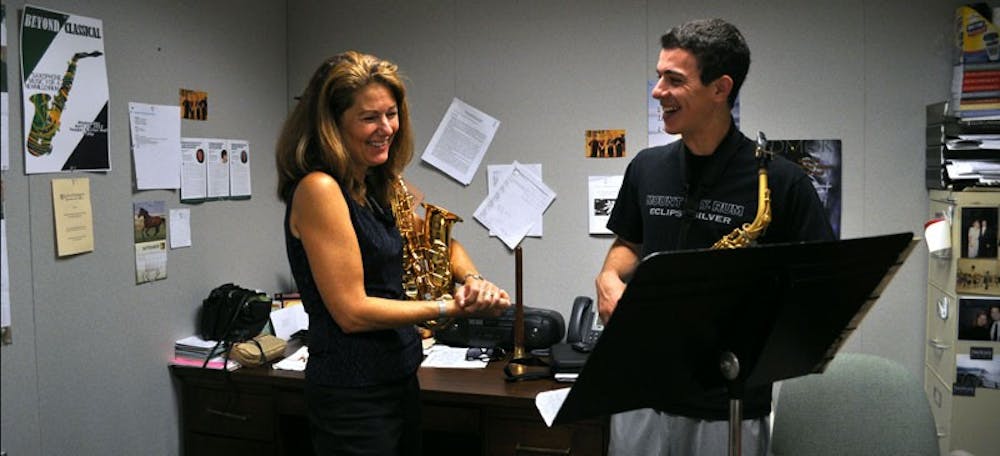When Virginia Novine-Whittaker began studying music, her reason for choosing the saxophone was a bit unorthodox.
“When I first had to choose an instrument, I thought, ‘What can I play that’s involved in the most groups so I could be in everything?’” Whittaker said. “‘What would be kind of cool?’ And (the saxophone) is it.”
Now, Whittaker — an adjunct instructor of music at Elon University — is passing on her love for the saxophone through private instruction for students with all levels of experience. Outside of lessons for music majors, Whittaker said she is happy to take on students who have never played an instrument before.
“There’s a lot of opportunities for students on campus to get involved in the music department if they’re not majors,” Whittaker said. “I had a student last semester (who) just always thought saxophone was cool and she wanted to take something that was different. I taught her how to read music. In one semester, we went from her not ever blowing a note on an instrument or reading music, to being able to play some intermediate jazz lines that sounded really good.”
Of course, Whittaker also offers private instruction to advanced music majors, and many of her students have gone on to procure jobs in the professional industry. A number of Elon graduates are now working as band directors and studio musicians. One alumnus is teaching saxophone students in the military.
[quote]You have to live a life that has meaning. You have to live life large, and then you just play it large. --Virginia Novine-Whittaker, adjunct instructor of music[/quote]
For Whittaker, though, the study of music has never been about career success. It is about passion and expression.
“Musicians have a means of expression that goes beyond words, and people who don’t have that wish for it,” she said. “That’s what grabs me. And I love all the different emotions you can play and all the colors and all the different roles you can take on.”
Whittaker said many students are not accustomed to wearing their hearts on their sleeves, which is practically required of musicians. But with some instruction, she said she believes anyone can learn the art of expression.
“You have to live a life that has meaning,” Whittaker said. “You have to live life large, and then you just play it large. I want to be able to share that and teach students how they can get in touch with that part of themselves.”
Whittaker’s most sincere example of student transformation comes from several years ago, when a struggling high school student, who had run away from home, was still attending her saxophone lessons despite living on the streets.
“I just hung in there with her, I kept teaching her,” Whittaker said. “It was the one thread that held her from falling off. For some (students), this is what they do. We’ve got to let them do it.”
Whittaker said the importance of arts education is what drives her to keep teaching.
“It is important on so many levels for someone to study this,” she said. “It’s one of the few things that we do that has delayed gratification. It teaches the concept of how wonderful it is to achieve something after you’ve worked so hard and long for it.”


